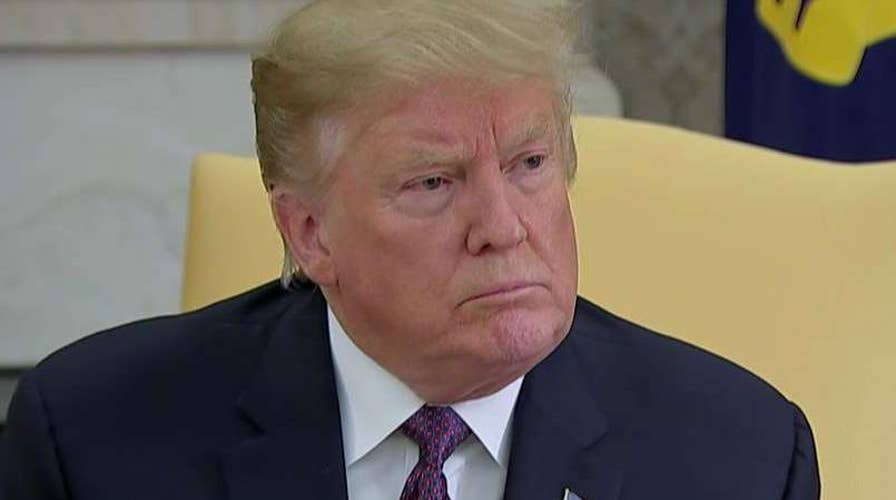Iranian President Hassan Rouhani’s advisor assailed President Trump Tuesday, saying he will get a “war” for listening to National Security Advisor John Bolton, referring to him as “the mustache.”
Hesamoddin Ashena, Rouhani’s key advisor, took to Twitter after U.S. military experts suggested “Iran or its proxies” damaged four commercial ships off the coast of the United Arab Emirates (UAE) Sunday.
“You wanted a better deal with Iran. Looks like you are going to get a war instead. That’s what happens when you listen to the mustache. Good luck in 2020!” Ashena wrote in a tweet.
IRANIAN CLERIC THREATENS U.S. NAVY FLEET AMID WARNING REGIME COULD TARGET COMMERCIAL SHIPS
Ashena's comments were also echoed by Iran's ambassador to the United Kingdom, Hamid Baeidinejad, who warned the U.S. in an interview with Sky News on Tuesday.
“Don't test us,” he said is the Iranian regime’s message to the Trump administration, noting that the Iranian military is “fully ready” for any conflict in the region.
“While we have renounced any escalation in the region, I would assure you that Iranian armed forces are fully ready for any eventuality in the region, so they should not try to test the determination of Iran to confront any escalation in the region,” he said.
Iran's Supreme leader Ayatollah Ali Khamenei however later appeared to downplay any prospect of war between the two countries.Iran's state TV quoted Khamenei on Tuesday as calling negotiations with the U.S. "poison" and saying: "This is not a military confrontation, because no war is going to happen."
Khamenei, who has final say on all state matters, said: "Neither we, nor they are seeking war, they know that it is not to their benefit."
Mike Pompeo, the U.S. Secretary of State, also sought to downplay any notion of conflict.
“We fundamentally do not seek a war with Iran, we’re looking for the regime to simply stop conducting assassination campaigns throughout Europe,” he said Tuesday in the seaside resort of Sochi, Russia.
His comment follows assertions by Trump administration officials that they have detected signs that Iranian or Iranian-backed proxies were preparing for possible attacks against American interests in the Mideast. The administration cited the threats as the reason for expediting the deployment of an aircraft carrier strike group and other military resources to the region.
“While we have renounced any escalation in the region, I would assure you that Iranian armed forces are fully ready for any eventuality in the region, so they should not try to test the determination of Iran to confront any escalation in the region.”
Iran or Iranian-backed proxies reportedly used explosive charges on the ships, causing a 5-to-10-foot hole in each near or just below the water line.
A Norwegian-flagged vessel, two Saudi oil tankers and a bunkering tanker flagged in Sharjah, one of the UAE's seven emirates, all suffered similar damage Sunday.
Bolton has long been known as an arch critic of the Iranian regime and is deemed a foreign policy hawk in the Trump administration.
Earlier this month, Bolton announced that the U.S. is sending the USS Abraham Lincoln Carrier Strike Group and a bomber task force to the Middle East in order "to send a clear and unmistakable message to the Iranian regime.”
TRUMP WARNS IRAN, SAYS COUNTRY WILL 'SUFFER GREATLY' IF IT DOES 'ANYTHING' AMID TENSIONS
Trump warned Iran on Monday afternoon that it will “suffer greatly” if the country does “anything” in the form of an attack.
His warning came just days after Iran warned it easily could destroy a naval fleet sent by the United States in order to ward off a potential threat to U.S. commercial interests.
“Their billion[-dollar] fleet can be destroyed with one missile,” Ayatollah Tabatabai-Nejad said, according to Reuters.
“If they attempt any move, they will ... [face] dozens of missiles because at that time [government] officials won't be in charge to act cautiously, but instead things will be in the hands of our beloved leader, Ayatollah Ali Khamenei,” he warned.
The escalation also follows the increasing diplomatic and economic pressure on Iran, which the U.S. has accused of threatening American interests and allies in the region, including Saudi Arabia and the UAE.
Meanwhile, British Maj. Gen Chris Ghika, a senior coalition officer, said the U.S.-led military coalition combating ISIS has detected no increased threat lately to its troops in Iraq or Syria from Iranian-backed forces.
"No, there's been no increased threat from Iranian-backed forces in Iraq and Syria," he said. "We're aware of their presence, clearly, and we monitor them, along with a whole range of others because that's the environment we're in."
CLICK HERE TO GET THE FOX NEWS APP
U.S. Central Command disputed that.
"Recent comments from [Operation Inherent Resolve's] Deputy Commander run counter to the identified credible threats available to intelligence from U.S. and allies regarding Iranian backed forces in the region. U.S. Central Command, in coordination with Operation Inherent Resolve, has increased the force posture level for all service members assigned to OIR in Iraq and Syria. As a result, OIR is now at a high level of alert as we continue to closely monitor credible and possibly imminent threats to U.S. forces in Iraq," CENTCOM spokesman Capt. Bill Urban said.
Fox News' Lucas Tomlinson contributed to this report.









































